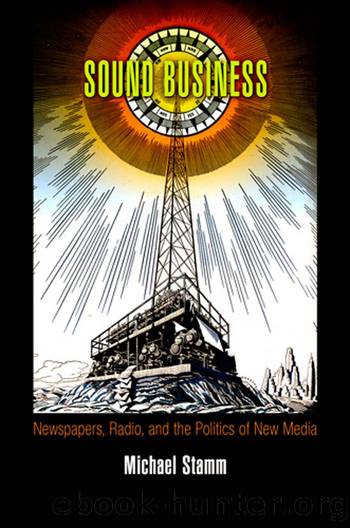Sound Business by Michael Stamm

Author:Michael Stamm [Stamm, Michael]
Language: eng
Format: epub
Tags: History, United States, 20th Century, Social Science, Media Studies
ISBN: 9780812205664
Google: PXHuUO_UJi4C
Publisher: University of Pennsylvania Press
Published: 2011-05-03T22:17:12+00:00
Chapter 5
Media Corporations and the Critical Public: The Struggle over Ownership Diversity in Postwar Broadcasting
In May 1942, Archibald MacLeish, the poet turned director of the governmentâs Office of Facts and Figures, addressed the 20th Annual Convention of the National Association of Broadcasters in Cleveland to plead with broadcasters for their assistance in the war effort. MacLeish stated that Americans âdo not need exhortation; they do not need and do not want the promises and threats which the Nazi radios pour upon the German people; they do not need and will not abide the hysteria, the false heroics, the brassy rhetoric of the Italian loud-speakers. They need, and want, and are entitled to have the truth; they need and want and are entitled to know what is expected of them, what they are required to do.â It was the task of broadcasters, MacLeish claimed, to rise to the occasion. âYou have something to give this war which no other body of men could possibly give it,â MacLeish stated. âYou have the inventiveness, and the courage and the imagination which have made American radio one of the great forces of enlightenment in the world. We ask you to mobilize these qualities for the winning of this war.â1
Broadcasters responded eagerly and became active participants in the war effort. Many radio comedies and dramas incorporated war-related themes, broadcasters increased their news coverage of the war and international affairs, and the networks produced a variety of programming to boost domestic morale and sustain support for the war. With key radio industry figures moving into government positions during the war, state and media developed an efficient and effective system to integrate messages supporting the war effort into regular broadcasts. Broadcastersâ motivations for cooperating with the government in the war effort were at some level undoubtedly patriotic, but they were also undoubtedly self-serving. Aiding in the war effort was financially beneficial to broadcasters as it allowed them to maintain their existing program schedules as much as possible, thus ensuring that radio continued to generate healthy revenues.2
Aiding in the war effort was also legally and politically strategic for broadcasters, as it gave them a chance to challenge government regulation through patriotic participation. As the trade group Broadcastersâ Victory Council told its members, the war offered broadcasters an opportunity to âjustify our existence and at the same time safeguard our unique privileges of free kilocycles and free speech.â At a time when the federal government was conducting major investigations of the structures of the media industries, broadcasters essentially traded good behavior during World War II for what they hoped would be favorable treatment later. Byron Price, the director of censorship for the federal governmentâs wartime Office of Censorship, made this clear in a speech in March 1943. âWar is too gigantic a business to be carried on in complete secrecy,â Price argued, and if newspapers âwere to publish everything they knew, the task of war would be hopeless.â Price argued that the media had acted graciously and professionally in
Download
This site does not store any files on its server. We only index and link to content provided by other sites. Please contact the content providers to delete copyright contents if any and email us, we'll remove relevant links or contents immediately.
| General Broadcasting | History & Criticism |
| Reference |
Childhood's End by Arthur C. Clarke(2079)
The Fellowship of the Ring (The Lord of the Ring, #1) by J.R.R. Tolkien(1769)
Childhood's end by Arthur C. Clarke(1659)
The Stars Are Fire by Anita Shreve(1646)
Tolkien, J. R. R. - The Fellowship of the Ring by Tolkien J. R. R(1533)
The Lord of the Rings: The Fellowship of the Ring, the Two Towers, the Return of the King by J. R. R. Tolkien(1430)
Howard Stern Comes Again (9781501194313) by Stern Howard(1416)
Ballet For Dummies by Scott Speck & Evelyn Cisneros(1407)
Black Privilege by Charlamagne Tha God(1353)
The Return of the King by J.R.R. Tolkien(1283)
Dark Fire by C.J. Sansom(1267)
Thunderstruck by Erik Larson(1258)
The Fellowship of the Ring (The Lord of the Rings, Book 1) by J. R. R. Tolkien(1226)
The Lord Of The Rings Part 03: The Return Of The King by J.R.R. Tolkien(1216)
Agatha Christie - 1945 - Sparkling Cyanide by Agatha Christie(1212)
Frenchman's Creek by Daphne Du Maurier(1198)
Narnia 02 - The Lion, the Witch and the Wardrobe by C. S. Lewis(1143)
The Fellowship Of The Ring by J.R.R. Tolkien(1142)
The Collected Raymond Chandler by Raymond Chandler(1141)
